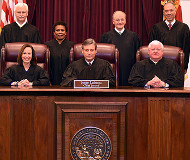Article from: www.thenewspaper.com/news/64/6458.asp
5/4/2018
Florida Supreme Court Spikes Red Light Camera Challenge
Florida Supreme Court sees no problem with local use of red light cameras.
 The photo enforcement industry picked up another win before state high court judges on Thursday. This time, in Florida, the Supreme Court decided that the use of private, for-profit contractors in running every aspect of a photo ticketing program is consistent with the intent of state lawmakers.
The photo enforcement industry picked up another win before state high court judges on Thursday. This time, in Florida, the Supreme Court decided that the use of private, for-profit contractors in running every aspect of a photo ticketing program is consistent with the intent of state lawmakers.
The question before the court was whether state law allows those private vendors to review tickets and decide who is guilty before passing those tickets on to a municipal traffic enforcement officer so that the private vendor could then turn and drop the ticket in the mail on the municipality's behalf. The lower courts split on the issue (view rulings), but the high court justices all agreed in the conclusion that the current setup is exactly what the legislature authorized when it said an agent of a municipality could "review" a citation.
"The legislature did not define, or otherwise elaborate upon, the word 'review' in section 316.0083," Justice Barbara J. Pariente wrote for the majority. "By including two specific examples of what is not a traffic infraction immediately before stating that an authorized agent can review the information captured by red light cameras, which includes photographs and video, it is clear the legislature contemplated that the agent would conduct an initial review of those photographs or video or both... There is simply no indication that the legislature intended the narrow definition of the word 'review' advanced by Jimenez."
The high court disagreed with the lower court that found, in practice, that guilt determinations were being made by the for-profit vendor as part of a turn-key business where the municipal review was merely a formality (view ruling).
"Ultimately, Jimenez cannot escape the fact that the term 'review,' as used in section 316.0083, indicates some evaluative component, and there is no indication that the legislature intended the most restrictive version of the term in the context of this statute," Justice Pariente wrote.
Justices Charles T. Canady, Ricky Polston and Alan Lawson had a different explanation for why they arrived at the same conclusion as the majority.
"The critical issue is not the details of the relationship between the local government and the vendor," Justice Canady wrote. "Rather, the dispositive point is that the local government conforms to the requirement that only law enforcement officers and traffic infraction enforcement officers -- rather than employees of a vendor -- may issue traffic citations."
A copy of the ruling is available in a 400k PDF file at the source link below.
Source: Jimenez v. Florida (Florida Supreme Court, 5/3/2018)
Permanent Link for this item
Return to Front Page
 The photo enforcement industry picked up another win before state high court judges on Thursday. This time, in Florida, the Supreme Court decided that the use of private, for-profit contractors in running every aspect of a photo ticketing program is consistent with the intent of state lawmakers.
The photo enforcement industry picked up another win before state high court judges on Thursday. This time, in Florida, the Supreme Court decided that the use of private, for-profit contractors in running every aspect of a photo ticketing program is consistent with the intent of state lawmakers.